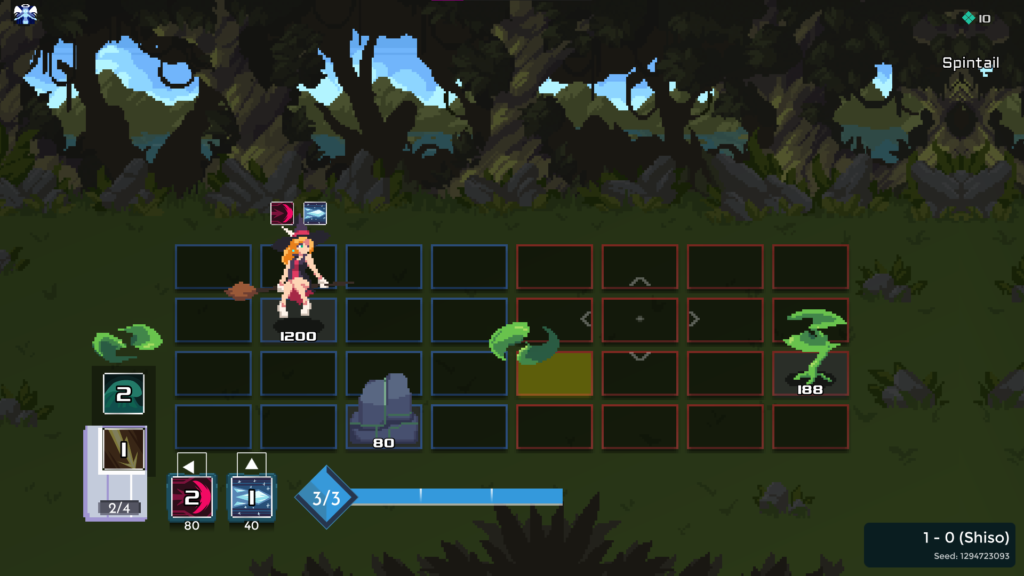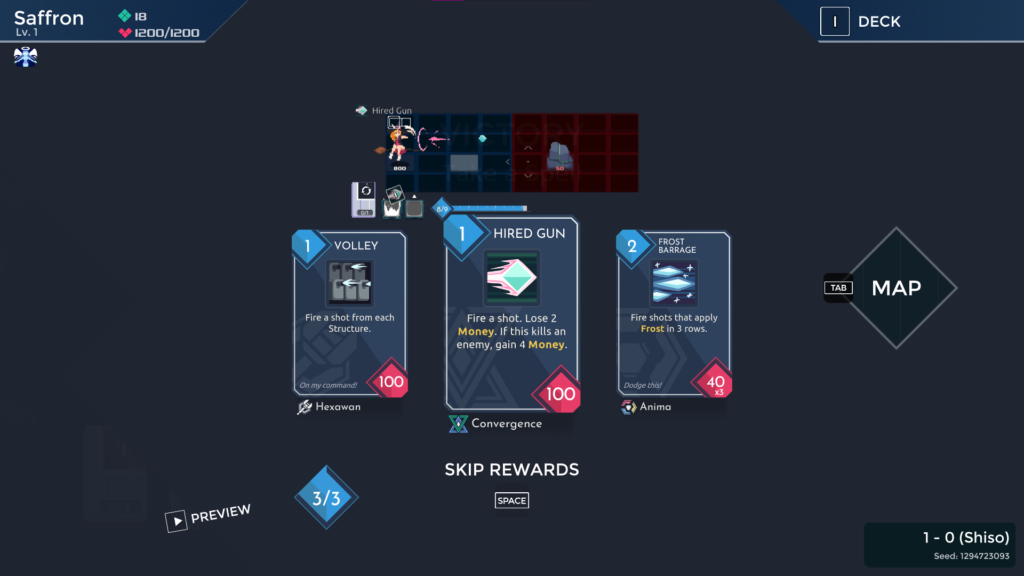**mild spoilers for One Step From Eden
When people talk about video games genres, there is a heavy focus on the mechanics of the game. In our in-class discussion of the roguelike genre, mentioning the elements of randomness and permadeath felt unavoidable, since those are defining features of games that we consider to be roguelikes, or at the very least close to the idea of what a roguelike should be. This should be natural, since the whole purpose of genres is to encapsulate common ideas used across different games.
However lately, I find that whenever I try to describe a game, especially to people who are already well-acquainted with games, I tend to use phrases such as “It’s kind of like…” or “If you’ve ever played…” before I start explaining the actual mechanics. It almost feels as if some modern games nowadays embody their own mini-genres with how uniquely they’re designed. For example, I first picked up Slay the Spire about a month before it was released from early access, at the start of 2019. Although Slay the Spire certainly wasn’t the first of its kind, about another year or two later, I noticed a ton of new “deckbuilder roguelike” games popping up. Some looked pretty similar to Slay the Spire, such as Griftlands, Second Second, and Pirates Outlaws, but there were also other deckbuilder roguelikes that tried to switch things up a bit, such as Monster Train, Dicey Dungeons (which is arguably not even a deck builder), and most notably One Step From Eden.
One Step From Eden?
One Step From Eden is typically described as a real-time action deckbuilder roguelike, and is often talked about in conjunction with Mega Man Battle Network because of how unique its combat system is. Combat consists of the player moving their character around a 4×4 grid as they try to dodge the enemies on an adjacent 4×4 grid. The player has a deck of spells that launch attacks in specific patterns or do other things like heal and buff. There are a series of encounters within each stage, with a boss at the end, and there are multiple stages within each run, a la Slay the Spire.


One Step From Eden being a deckbuilder seems to be a very clear argument to make: there is a default deck of spells that the player starts out with, and the player is given the chance to add cards (and also upgrade them) as the run progresses. The cards also have many synergies across them and there are even artifacts, reminiscent of Slay the Spire‘s relics. The developers clearly put time and effort into making sure the deckbuilding is varied and interesting. However the point of contention I want to make is that although the deckbuilding mechanics are there, I wouldn’t necessarily agree with One Step From Eden being primarily a deckbuilding game, because of how I choose to play the game.
Where Play Experience Comes In
I was streaming myself playing OSFE to a couple of friends, and one of them would often tell me to take cards or artifacts I would’ve ignored. His argument would go along the lines of “there are later cards in the game that synergize well” or “you have an artifact that synergizes with this card,” all of which are perfectly valid arguments. However my primary playstyle consists of having few high-damage cards so I can focus primarily on dodging. From my point of view, dodging is first priority. Too many cards will force me to think too much about card order and may cause me to get hit more often.
The ways we play differ greatly from each other: I mainly focus on the action aspect of the game while my friend puts a lot more emphasis on the deckbuilding aspect of the game. Just to be clear, I’m not saying OSFE isn’t a deckbuilder. Rather, the purpose of this anecdote is to explain why, if I were to explain One Step From Eden to another person, I would mention the deckbuilding part in the second or third sentence rather than the first one, despite the prevalence of such mechanics.
The role of play in this particular story may seem a bit underwhelming, but I think it can extend beyond which sentence I decide to explain a particular mechanic of a game. There was a very brief discussion on the Discord about whether Temple Run or Minecraft were more like a roguelike. Thomas brought up an interesting point about how over the summer they practiced speedrunning Minecraft, which was very reminiscent of the playstyle of a roguelike: random world generation and permadeath across different attempts. Would people who exclusively speedrun Minecraft consider it to be a roguelike?
Genres are Subjective
In One Step From Eden, the player has the option to spare or kill each boss after the end of a level, which will actually cause the final level to change based on these decisions. Does that make One Step From Eden an Undertale-like? It may be more Undertale-esque to some than other, depending on how often they choose to interface with that mechanic of the game. Is Tetris a fighting game? People who play primarily Tetris 99 or Puyo Puyo Tetris might agree, but people who grew up on classic Tetris may not. I somewhat jokingly refer to Minecraft as a horror game, but in part I consider that to be true, since exploring caves can be a genuinely terrifying experience. Genres are somewhat subjective, and an individual’s experience plays a part in how they view the genre(s) of a game.

As another person who has a lot of hours in One Step From Eden, I certainly agree with this description. I think another interesting facet of naming genres is how we might prioritize certain genres in description, depending on what we think the audience is familiar with.
For example, in the case of this game, I might say that the general gameplay is heavily inspired by Mega Man Battle Network, and would use that as the first descriptor for a familiar audience. However, since most people younger than me tend not to have played GBA games, I tend to fall back on calling it a bullet hell, or if even that fails, “real-time Slay the Spire.”
These genres are very different, but I would still use them first in different situations. When describing a game, I feel like the most important thing is to provide as much accurate information about the game as possible. Using a narrower, more specific genre is a good way to do that, but it comes with the risk of meaning nothing to the wrong audience.
In other words, souls-like is an unfortunate descriptor, but it gets the job done.
Also, let me guess: you play Saffron mainly? (I generally pick Shiso or Gunner)
I’m a Selicy main because the starter deck is strong enough that I don’t feel obligated to take many cards! I only used Saffron for the screencaps because she’s the first character.